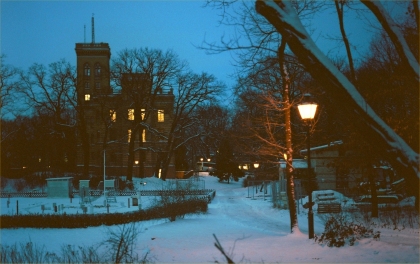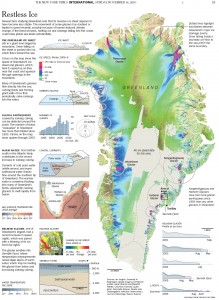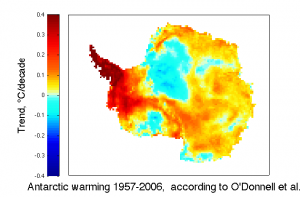Climate science appears to be just like any other science. At least, this is the conclusion from a fresh publication by Marianne Ryghaug and Tomas Moe Skjølsvold (“The global warming of climate science: Climategate and the construction of scientific facts” in International studies in the philosophy of science). This finding is not news to the research community, but this analysis still hints that everything is not as it should be – because why would anyone report from a crime scene if the alleged crime has not even been committed?
Communicating Climate
Overheard in the newsroom
Reporter doing a phone interview: “Please slow down, professor. You’ve been researching this topic for a decade. I’ve been researching it since lunchtime.”
From here (h/t Josh).
Forbes’ rich list of nonsense
Guest commentary from Michael Tobis and Scott Mandia with input from Gavin Schmidt, Michael Mann, and Kevin Trenberth
While it is no longer surprising, it remains disheartening to see a blistering attack on climate science in the business press where thoughtful reviews of climate policy ought to be appearing. Of course, the underlying strategy is to pretend that no evidence that the climate is changing exists, so any effort to address climate change is a waste of resources.
A recent piece by Larry Bell in Forbes, entitled “Hot Sensations Vs. Cold Facts”, is a classic example.
[Read more…] about Forbes’ rich list of nonsense
Post-holiday round-up
What with holiday travel, and various other commitments, we’ve missed a few interesting stories over the last week or so.
First off, AGU has posted highlights from this year’s meeting – mainly the keynote lectures, and there are a few interesting presentations for instance from Tim Palmer on how to move climate modelling forward, Ellen Mosley-Thompson on the ice records, and David Hodell on abrupt climate change during the last deglaciation. (We should really have a ‘videos’ page where we can post these links more permanently – all suggestions for other videos to be placed there can be made in the comments).
More relevant for scientist readers might be Michael Oppenheimer’s talk on the science/policy interface and what scientists can usefully do, in the first Stephen Schneider Lecture. There was a wealth of coverage on AGU in general, and for those with patience, looking through the twitter feeds with #agu10 shows up a lot of interesting commentary from both scientists and journalists. Skeptical Science and Steve Easterbrook also have good round ups. [edited]
Second, there was a great front page piece in the New York Times by Justin Gillis on the Keeling curve – and the role that Dave Keeling’s son, Ralph, is playing in continuing his father’s groundbreaking work. Gillis had a few follow-up blogs that are also worth reading. We spend a lot of time criticising media descriptions on climate change, so it’s quite pleasing to be praising a high profile story instead.
Finally, something new. Miloslav Nic has put together a beta version of an interactive guide to IPCC AR4, with clickable references, cited author (for instance, all the Schneiders) and journal searches. This should be a very useful resource and hopefully something IPCC can adopt for themselves in the next report.
Back to normal posting soon….
A brief history of knowledge about Antarctic temperatures
Sources in italics.
Scott: It’s cold here.
The media: Scott is a hero!
Scott: It’s really really cold here.
The media: Scott is a hero!
Amundsen: It’s not that cold.
The media: Scott is a hero. Oh, and Amundsen.
Public: Shackleton is a hero, but please shut up, there’s a war on.
Mid 20th Century:
Geophizzicists: Let’s find out just how cold it is.
Media: Scott is a hero!
Public: yawn…
Late 20th Century:
Scientists: It’s colder in some place than others.
Media: Antarctica is cooling.
Scientists: It’s cooling at the South Pole, but warming very fast on the Peninsula.
Media: Antarctica is cooling, but warming faster than anywhere else on earth.
Public: Huh…?
2000
Thompson and Solomon: Most of Antarctica is cooling in summer, but it is warming on the Peninsula. We think it has to do with the ozone hole.
Media: Because of ozone, Antarctica is warming faster than anywhere else on earth and we are all going to die.
Public: Huh…?
Early 21st Century:
2006
Scientists: The troposphere over Antarctica is warming significantly in winter.
Media: Even though that paper was published in Science, our readers don’t know what the troposphere is. Neither do we. Next?
2007
Scientists: The troposphere over Antarctica is warming significantly in winter and spring, especially over West Antarctica.
Media: That paper wasn’t published in Nature, so we’re not very interested.
2009
Scientists: Antarctica is cooling in fall — not summer — in some places, but warming, especially in winter and spring, especially in West Antarctica.
Media: Antarctica stops cooling! Conservative or liberal, we are ALL going to die.
Steve McIntyre: The “team” made up the data again. I don’t know what Antarctica is doing, but I think it is probably cooling.
Media: Antarctica starts cooling again, global warming is a fraud.
2010
Ryan O’Donnell: Our paper in the Journal of Climate shows a somewhat better way to look at the same data. Antarctica is warming a bit more in summer, and a bit less in winter in the Ross Sea region. In fall it is cooling a bit more too, and so the overall trends are smaller. Still, West Antarctica is definitely warming significantly, as Steig et al. found. That’s interesting.
Eric Steig: Nice paper Ryan. Thanks for sending along a pre-print.
Steve McIntyre: Hey, we got published in the Journal of Climate! Another paper showing that the “team” made up the data again! (Sotto voce): Ryan says it it is warming a bit more in summer, and a bit less in winter in the Ross Sea region. In fall it is cooling a bit more. Otherwise we get the same results, though the magnitude of the trends is smaller. But West Antarctica is still warming significantly. But I really don’t care. The peer review process is broken, which is why.. umm…our paper was published in the leading climate journal.
Liberal Media: That paper wasn’t published in Nature, so we’re not very interested.
Conservative Media: Antarctica is cooling. Global warming is a fraud.
Public: zzzZZZzzz
————-
P.S. For those actually interested, yes, I’ll have more to say about O’Donnell et al., but overall, I like it.–eric
The AGU Q & A Service–Open for Business
This is just a brief notice for those members of the media who may not be aware of the American Geophysical Union‘s (AGU) re-vamped question and answer service for climate science questions. There are about 700 participating AGU scientists, with several answering questions at any given time. This service should be highly useful for getting relatively quick answers to specific, climate science questions during the United Nations COP-16 negotiations in Cancun, Mexico this week, as well at the AGU annual meeting which runs the following week. The service will continue some time beyond the AGU meetings as well.
Contrary to incorrect media and blog stories last month, this service is for climate science questions only from members of the media–no policy or politically related questions are fielded. Go here for more background and procedural information if interested.
Update: The Service’s coordinator informs us that bloggers are considered part of the media, and so their questions are welcome as well.
Update 2: Jeff Taylor, the service’s coordinator, has addressed, in the comments, a number of the questions and suggestions raised, and provided further links for those with more questions about climate and/or the service’s operation.
Coldest Winter in 1000 Years Cometh. Not.
This claim circulates in the internet and in many mainstream media as well: Scientists have allegedly predicted the coldest winter in 1,000 years for Europe. What is behind it? Nothing – no scientist has predicted anything like it. A Polish tabloid made up the story. An interesting lesson about today´s media.
By Stefan Rahmstorf and Olivia Serdeczny
We had read about it a few times and last Wednesday even were asked by German TV about the allegedly coldest winter in 1000 years, predicted by (depending on the source) Polish or Russian climatologists or meteorologists. Reason enough for us to take a closer look at the story behind the story.
It did not take much googling to find the source: various articles on the internet name the Polish scientist Michał Kowalewski, sometimes in the Russian spelling version of Mikhail Kovalevski. A few clicks later we arrive at the original article with Kowalewski´s quotes. Except that Kowalewski does not predict a record winter there – the “millennium winter” merely appears in the headline. A closer reading of the article quickly reveals: the quotes were answers to questions concerning the role of the Gulf Stream for Europe´s climate. The frosty temperatures are hypothetical effects of a breakdown of the Gulf Stream – which, as Kowalewski points out, can be pretty much ruled out.
We asked Kowalewski for his comments on the media coverage and promptly got his answer in an email from Warsaw:
The reports in some media are absolutely unbelievable. A journalist who interviewed me for radio had asked me about the theoretical climatic effects of a breakdown of the Gulf Stream. I answered that this purely hypothetic scenario would lead to much colder winters in Poland. A few days later I found on the internet the article of a journalist who mixed his own words with some of my quotes without their context so well that a completely new meaning came out. An absolutely absurd thesis. My quotes as such are correct, so I was not able to demand a correction.

Winter has Europe in its grip: the Süring-building of the Potsdam Institute.
It’s an interesting and insightful tale how this story spread. Here is a brief chronology:
September, 10. Michał Kowalewski is interviewed by the Polish radio station tok.fm. The same day the website of a Polish tabloid, Gazeta.pl, publishes an article with the headline of a „millennium record winter“ („once-in-a-millennium winter“). A certain Gianluigi Zangari is being quoted at the outset. He has apparently claimed to have found a slow-down of the Gulf Stream in satellite data, which he attributes to the BP oil spill (we did not follow this bizarre claim to the source). Subsequently Kowalewski´s radio interview is brought in – in order to explain the Gulf Stream and its effects on climate in general.
September, 12. „Fakt“, a Polish tabloid, writes „Millennium Winter is Coming!“ Again the BP oil spill is blamed. This time, however, without any reference to Zangari, so readers could easily be left with the impression that this is Kowalewski´s idea.
September, 22. The Voice of Russia reports that the Polish scientist „Mikhail Kovalevski“ is worried about the Gulf Stream breaking down, which Russian scientists counter as being an exaggeration.
Oktober, 4. The Russian RT News Service predicts „The coldest winter in 1.000 years“. Which is explained by the Gulf Stream having slowed down by half. RT refers to Polish scientists: “Polish scientists say that it means the stream will not be able to compensate for the cold from the Arctic winds. According to them, when the stream is completely stopped, a new Ice Age will begin in Europe”. This is where the Russian Vadim Zavotschenkow enters the scene. However, he mentions merely a cold winter: “Although the forecast for the next month is only 70 percent accurate, I find the cold winter scenario quite likely”.
Oktober, 4. The “climate sceptics” website wattsupwiththat, noted for their false reports, takes up the RT piece, presents it together with The Voice of Russia and mentions „Mikhail Kovalevski“. Watts seems to be the bridge for the story´s crossing into the western media. Is it just coincidence that the „record cold winter“ story nicely suits the political agenda of the climate sceptics?
From then on, the story is repeated on many other European media, including serious newspapers and television.
It is staggering how one journalist just copied another, sometimes even embellishing the story, without ever bothering to check the source or ask Kowalewski himself. It took us less than ten minutes of googling to get serious doubts about whether this story was real. The familiar pattern of „Chinese whispers“ emerges here once again – the same that widely spread the false whatevergate-stories.
But the often self-righteous free western press can actually learn a lesson from its Chinese counterpart in this case. The Chinese news agency Xinhua checked the story and issued the following on October, 20.:
A forecast attributed to Polish scientists of the coldest European winter in 1,000 years has drawn plenty of media attention recently but investigations by Xinhua reporters have cast doubts on its veracity.
p.s. There are, by the way, scientifically well-founded attempts to explain the currently cold weather in Europe. The basic check for seriousness: a peer-reviewed journal source is provided, and according to Google Scholar the author has a decent publication record. A millennium-record-winter, however, is not being predicted there.
p.p.s. Should your newspaper have also reported this turkey, feel free to write a polite letter to the to editors asking for a correction. It is only if readers demand published information to be verified (or if needed corrected) that something will change to the better.
This article is adapted from the German original at KlimaLounge.

Olivia Serdeczny is a scientist with the Potsdam Institute for Climate Impact Research in Germany.
The new post-partisan world
One year later
I woke up on Tuesday, 17 Nov 2009 completely unaware of what was about to unfold. I tried to log in to RealClimate, but for some reason my login did not work. Neither did the admin login. I logged in to the back-end via ssh, only to be inexplicably logged out again. I did it again. No dice. I then called the hosting company and told them to take us offline until I could see what was going on. When I did get control back from the hacker (and hacker it was), there was a large uploaded file on our server, and a draft post ready to go announcing the theft of the CRU emails. And so it began.
From that Friday, and for about 3 weeks afterward, we were drafted into the biggest context setting exercise we’d ever been involved in. What was the story with Soon and Baliunas? What is the difference between tree ring density and tree ring width? What papers were being discussed in email X? What was Trenberth talking about? Or Wigley? Or Briffa or Jones? Who were any of this people anyway? The very specificity of the emails meant that it was hard for the broader scientific community to add informed comment, and so the burden on the people directly involved was high.
The posts we put up initially are still valid today – and the 1000’s of comment stand as testimony to the contemporary fervour of the conversation:
I think we did pretty well considering – no other site, nor set of scientists (not even at UEA) provided so much of the background to counter the inevitable misinterpretations that starting immediately spreading. While some commentators were predicting resignations, retractions and criminal charges, we noted that there had not been any scientific misconduct, and predicted that this is what the inquiries would find and that the science would not be affected. (Note, the most thorough inquiry, and one that will have to withstand judicial review, is the one by EPA which, strangely enough, has barely been discussed in the blogosphere).
Overall, reactions have seemed to follow predictable lines. The Yale Forum has some interesting discussions from scientists, and there are a couple of good overviews available. Inevitably perhaps, the emails have been used to support and reinforce all sorts of existing narratives – right across the spectrum (from ‘GW hoaxers’ to Mike Hulme to UCS to open source advocates).
Things have clearly calmed down over the last year (despite a bit of a media meltdown in February), but as we predicted, no inquiries found anyone guilty of misconduct, no science was changed and no papers retracted. In the meantime we’ve had one of the hottest years on record, scientists continue to do science, and politicians…. well, they continue to do what politicians do.
Sea level rise: The New York Times got the story
Yesterday, the New York Times ran an excellent cover story on sea level rise, together with two full pages inside the paper, fancy graphs and great photographs (online version here). The author, Justin Gillis, researched the piece for months, visited Greenland and talked to most of the leading scientists in the field – many of which he cites in the article. The science presented is correct and up-to-date and the story is a gripping read. That’s how science journalism should be!
 What is going on in Greenland? (c) The New York Times.
What is going on in Greenland? (c) The New York Times.[Read more…] about Sea level rise: The New York Times got the story

